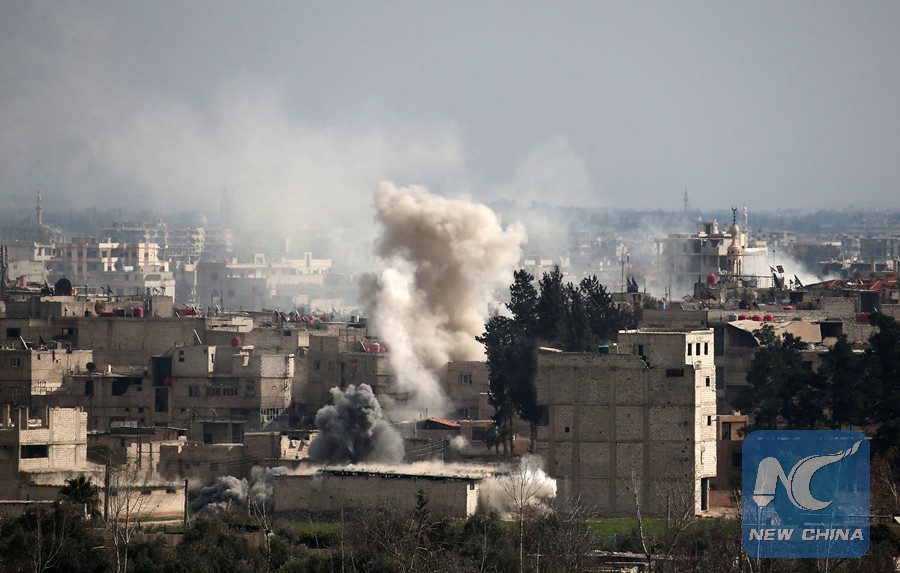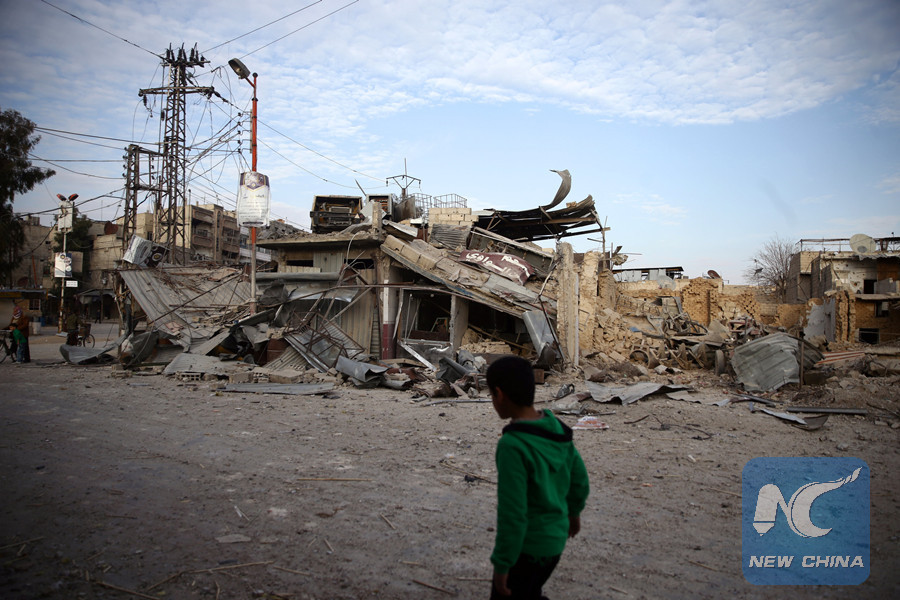
A picture taken on February 20, 2018 shows smoke plumes rising following a reported regime air strike in the rebel-held town of Hamouria, in the besieged Eastern Ghouta region on the outskirts of the capital Damascus. (AFP photo)
DAMASCUS, Feb. 23 (Xinhua) -- Just as people in Damascus thought the situation was becoming better and life was regaining its lost glamor in this oldest inhabited capital, the war persisted with another round of violence, pushing everyone over the edge.
The rebel-held Eastern Ghouta, once a holiday destination for Damascenes ahead of the war, has turned into a war-torn place where several rebel groups are entrenching and firing shells on Damascus.
Located a few kilometers east of Damascus, Eastern Ghouta is now the last major threat to the Syrian capital.
A couple of months ago, the rebels, mainly the al-Qaida-linked ones, launched a major offensive on a key military base in Harasta city in Eastern Ghouta, prompting the Syrian forces to launch a counter-offensive to push back the rebels.
However, the rebels renewed their mortar shelling on the capital, bombarding residential areas and sending the civilians into the fear of death or disability.

A young man rides bicycle near damaged houses in the besieged town of Douma, Eastern Ghouta, Damascus, Syria February 20, 2018. (Reuters photo)
The attack has apparently raised the ire of the government, as Eastern Ghouta was supposed to be a de-escalation zone as part of a deal mediated by Russia, Turkey, and Iran.
In recent days, unprecedented military reinforcements started gathering on the outskirts of Eastern Ghouta, with heavy firing at the rebel positions in the area as a prelude to the ground offensive.
Meanwhile, the rebels also intensified mortar shelling on the capital, killing dozens of people and wounding many others.
The pro-rebel London-based Syrian Observatory for Human Rights said at least 400 people have been killed by the heavy bombardment on Eastern Ghouta since Sunday.
In addition, pro-government Sham Fm documented 338 mortar blasts in Damascus since January and the killing of 79 people, including 17 children.

A child walks near damaged buildings in the besieged town of Douma, Eastern Ghouta, Damascus, Syria February 20, 2018. (Reuters photo)
Fear has become the shared feeling of Damascenes and the people in Eastern Ghouta, as the UN is urging the cessation of hostilities to allow aid to reach the 400,000 people estimated to being living in the rebel-held area.
Staffan de Mistura, the UN special envoy to Syria, described the situation of civilians in Eastern Ghouta as "appalling."
On Thursday, the Syrian helicopters dropped leaflets over Eastern Ghouta, urging the civilians to leave the area and not to cooperate with the rebels.
Life in Damascus, mainly in the eastern part close to Eastern Ghouta, has also been largely paralyzed, with people either cowering in their homes or checking temporarily in hotels in the safe western suburbs.
Kuwait and Sweden proposed a draft resolution to reach a one-month cease-fire in Eastern Damascus to allow aid to the needed.
However, Russia called the draft resolution "unrealistic," and proposed amendments to it.
Voting on the draft resolution will take place on Friday, and the result will determine what will happen in the next few days.
Manhal, a restaurant owner in the old Damascus area, said he had lost his customers there as a result of shelling.
"I am prepared to spend a few days in a hotel in the western suburbs of Damascus until the situation becomes clear," he added.
Fadi and his wife Amal, who moved from his house in Halab Street to the nearby Tijara, said they are feverishly waiting to see the result of the UN Security Council vote.
"I hope they reach a deal in the UN Security Council to avert more violence in the capital so that we can return home quickly," Amal told Xinhua over the phone.
"We want peace, peace, peace in Damascus because we are tired," she said in an excited tone.
Maher, a 29-year-old university student, said he is having mixed feelings at this point.
"I have a mixed feeling of fear, tiredness and boredom. All of those have accumulated over the past seven years. I cannot hide my fear and hope at the same time about tomorrow," he said.

